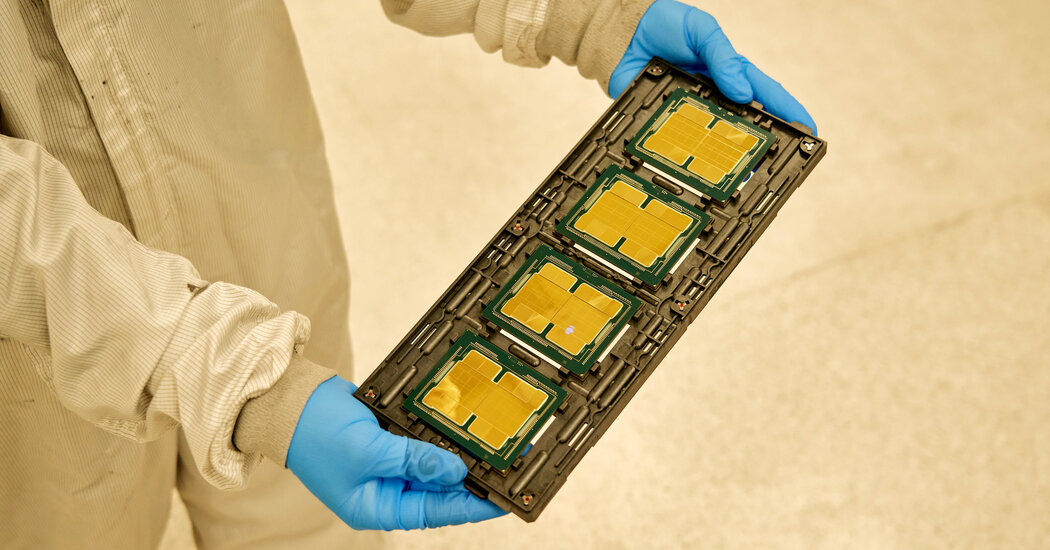Restricting China’s Access to High-Tech Chips for AI Development in the U.S.
October 18, 2023 | by Kaju

The Biden administration announced new restrictions on the sales of advanced semiconductors by American companies, further limiting China’s progress in supercomputing and artificial intelligence.
These rules are expected to prevent most shipments of advanced semiconductors from the United States to Chinese data centers, which use them for artificial intelligence models. U.S. companies planning to sell advanced chips or the machinery used to produce them to China will be required to notify the government or obtain a special license.
To avoid the risk of advanced U.S. chips reaching China through third countries, chip makers will also need licenses to ship to several other countries subject to U.S. arms embargoes.
The Biden administration argues that China’s access to advanced technology poses a security threat by aiding the country’s military activities and potentially endangering humanity if not properly controlled.
The restrictions may affect Chinese companies, such as ByteDance and Baidu, that have been developing AI chatbots. In the long term, the limits could weaken China’s economy as AI transforms various industries.
Sales to China of U.S. chip makers like Nvidia, AMD, and Intel are also likely to be impacted. Some chip makers generate a significant portion of their revenue from Chinese buyers and have lobbied against tighter restrictions.
The rules will exempt chips used for commercial applications like smartphones, laptops, electric vehicles, and gaming systems. Most of the rules will take effect in 30 days.
The Semiconductor Industry Association, representing major chip makers, stated that it is assessing the impact of the updated rules.
A senior administration official mentioned that attempts to circumvent previous rules prompted the updates. Advances in generative AI have provided regulators with more insight into the development and usage of large language models.
Gina M. Raimondo, the Secretary of Commerce, stated that the changes were made to ensure the effectiveness of the rules, with expectations of annual updates as technology evolves. The ultimate goal is to limit China’s access to advanced semiconductors for military applications.
Nvidia, a major player in the AI industry, expects no significant near-term impact on its financial results due to compliance with applicable regulations and global demand for its products.
The tougher rules could potentially strain U.S.-China relations as the Biden administration seeks to improve ties with China and prepare for a potential meeting between President Biden and Xi Jinping.
To counter China’s technological advancements, the Biden administration has invested in new chip factories in the United States. They have implemented narrow restrictions on technology exports to China with potential military uses, while allowing other trade to continue freely.
Technology classification as a threat to national security has been a contentious task. Semiconductor companies argue that overly restrictive trade bans hinder their revenue for investment in new facilities and research.
The limitations may also drive China’s development of alternative technologies, potentially weakening U.S. influence globally. Although Chinese researchers have made progress in developing advanced chips, they still lag behind Western capabilities.
The changes announced are particularly significant for Nvidia, the leading beneficiary of the AI boom. The new rules will restrict sales of chips designed by Nvidia for the Chinese market.
Although China contributes a significant portion of Nvidia’s data center revenue, growing global demand for their chips in AI applications may offset some of the losses from the restrictions.
The administration added two Chinese chip design companies to the “entity list” that requires special permission for U.S. companies to ship materials to them. A new “gray list” will require notification to the government for sales of certain less advanced chips to China and other countries under U.S. arms embargoes.
The rules do not appear to limit Chinese firms’ access to foreign cloud services provided by Amazon and Microsoft, which were previously used as a backdoor for accessing advanced AI chips. However, future measures in the form of an executive order could address this.
Experts suggest that the effects of these controls will become more apparent as non-Chinese companies release more advanced versions of their products. This could hamper China’s ability to reach the technological frontier in large-scale AI models and impact the country’s future productivity growth.
RELATED POSTS
View all


